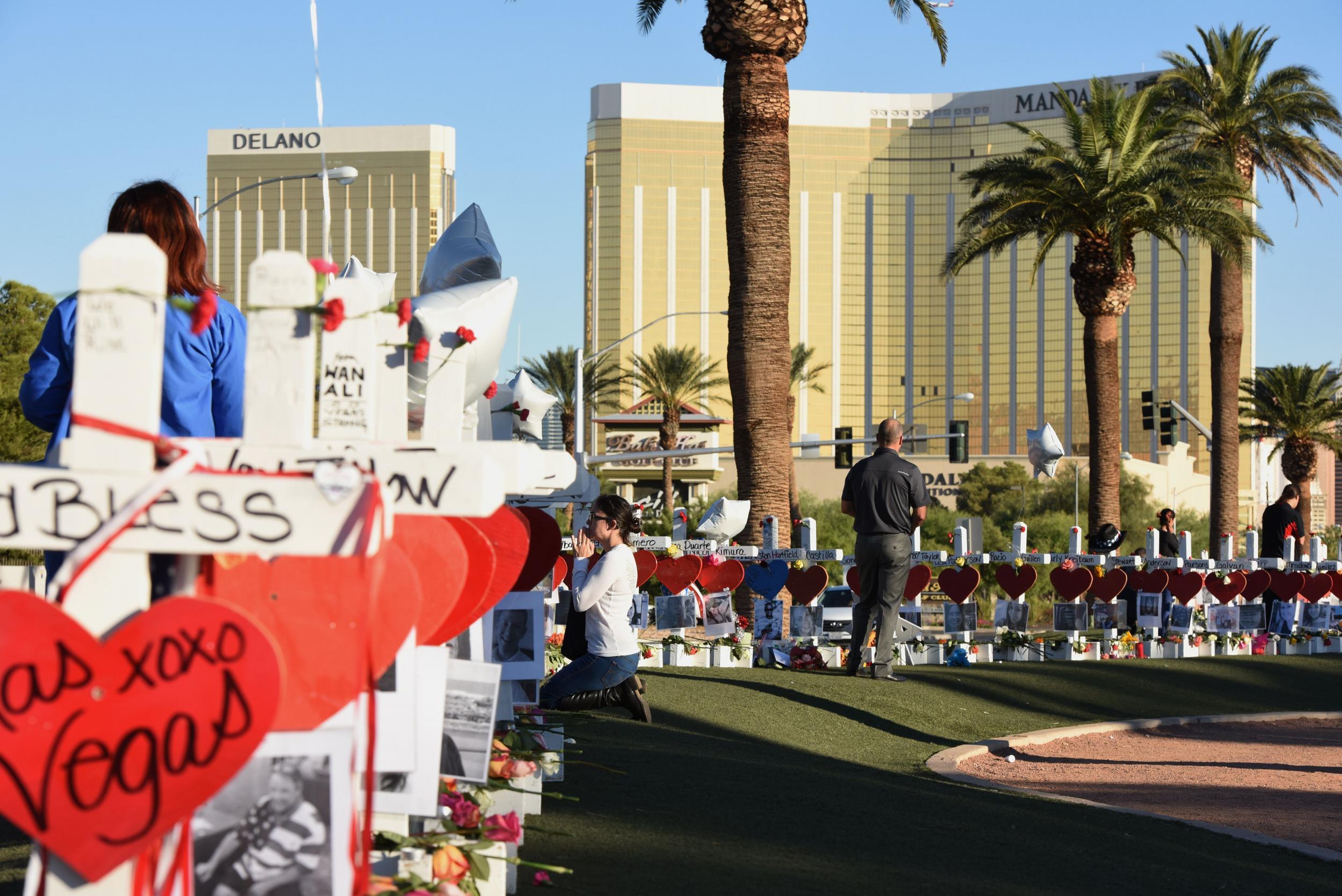Stephen Paddock's Las Vegas hotel room won't be rented out again, raising the question: What will happen to it?
MGM Resorts has not disclosed what will become of the site of America's deadliest shooting

Your support helps us to tell the story
From reproductive rights to climate change to Big Tech, The Independent is on the ground when the story is developing. Whether it's investigating the financials of Elon Musk's pro-Trump PAC or producing our latest documentary, 'The A Word', which shines a light on the American women fighting for reproductive rights, we know how important it is to parse out the facts from the messaging.
At such a critical moment in US history, we need reporters on the ground. Your donation allows us to keep sending journalists to speak to both sides of the story.
The Independent is trusted by Americans across the entire political spectrum. And unlike many other quality news outlets, we choose not to lock Americans out of our reporting and analysis with paywalls. We believe quality journalism should be available to everyone, paid for by those who can afford it.
Your support makes all the difference.The hotel room from which Stephen Paddock gunned down almost 60 people at a music festival in Las Vegas will no longer be rented out to the public, the hotel has said.
“This was a terrible tragedy perpetrated by an evil man. We have no intention of renting that room,” said MGM Resorts International, the company that manages the property.
The company did not provide any details about what it would do with the site of the deadliest mass shooting in modern US history. But the announcement raised another question: What should become of the sites of such massacres, in a country where there are almost as many mass shootings as there are days in a year?
Adam Lankford, a professor of criminology at the University of Alabama, said MGM had the right idea in shutting down the hotel room.
“I think not renting it out is good, but I think they shouldn’t call attention to that either,” Mr Lanford told The Independent. “The best thing would be to not rent it out, [and] if people call and ask which room it was, not to answer.”
Mr Lankford recently authored a letter urging the media not to publish the names of mass shooters. Along with more than 140 other cosigners, he argued that keeping shooters’ names out of the press will reduce the "copy-cat” effects of mass shootings, and deter future fame-seekers from staging an attack of their own.
Much the same can be said of the locations, Mr Lankford said.
“In the same way you don’t want to give these previous offenders attention, you don’t want to give the specific location of the attack attention,” he said. “Let it fade into history in the same way we hope the memory of these offenders do.”
In 2006, a 21-year-old opened fire in a North Carolina high school, killing one person and injuring two. Before leaving for the school that day, he sent an e-mail to the principal of Columbine High School – the site of a previous school shooting – to alert him that he would soon be making history. The young man had recently convinced his mother to drive him past Columbine High, and past the homes of the two infamous shooters.
Many potential copy-cats make similar "pilgrimages" to the locations of mass shootings, Mr Lankford said. In Las Vegas, he added, “it would not be mere speculation to say that someone who is considering an attack would want to go stay in that room”.
After the Columbine shooting, the library where most of the carnage occurred was replaced with an atrium. The library itself was rebuilt elsewhere. At Sandy Hook Elementary School, where 26 people were killed in a 2012 shooting, the building was completely torn down and rebuilt. The site of the school shootings at Virginia Tech were also remodelled into offices and laboratories.
But at Pulse nightclub in Orlando – the site of the second-most deadly shooting in America – the owners are still unsure what to do with the property, where 49 people were gunned down in 2016.
“When Pulse first happened, I remember telling myself, ‘Tear it down, tear it down, tear it down’,” Barbara Poma, the owner of the nightclub, told the New York Times. “...And now, 16 months later, people settled down, and some people are like, ‘No, it’s part of our history. You shouldn’t take it down.’ ”
Ms Poma founded the OnePulse Foundation to help in her decision. The OnePulse website is currently soliciting opinions from the community about a potential memorial and museum at the site of the shooting.
Mr Lankford understands the desire to build a memorial in Orlando, and in Las Vegas. But he cautioned against building yet another mass-shooting monument that could become a target for copycats.
“If you have something that specifically marks the site, that could be something that these copycats and at-risk individuals want to visit,” he said. “It creates a landmark.”
Join our commenting forum
Join thought-provoking conversations, follow other Independent readers and see their replies
Comments